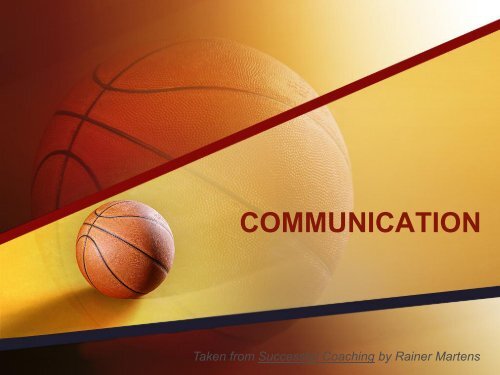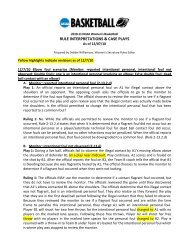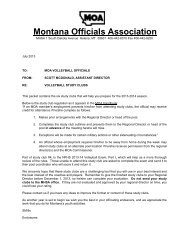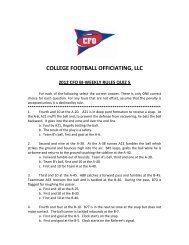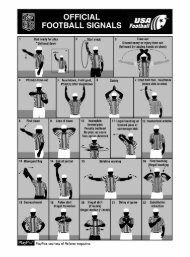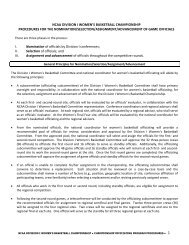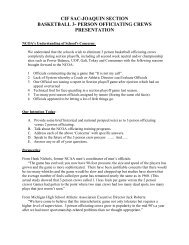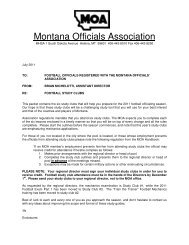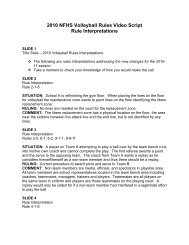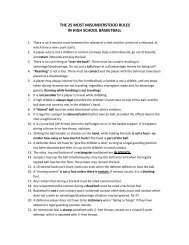Communicating with your Athletes - ArbiterSports
Communicating with your Athletes - ArbiterSports
Communicating with your Athletes - ArbiterSports
You also want an ePaper? Increase the reach of your titles
YUMPU automatically turns print PDFs into web optimized ePapers that Google loves.
COMMUNICATION<br />
Taken from Successful Coaching by Rainer Martens
Communication<br />
• Two dimensions of<br />
Communication<br />
• Six Steps of Communication<br />
• Sending and Receiving Messages<br />
– Sender/receiver failures<br />
• Communication Styles<br />
• Developing Skills<br />
• Confrontation
Communication<br />
• Two Dimensions of<br />
Communication<br />
– Sending and receiving messages<br />
– Verbal and nonverbal messages<br />
• Content (verbal) and emotion<br />
(nonverbal)
Six Steps of Communication<br />
Have a<br />
thought<br />
Response<br />
to<br />
message<br />
Thought<br />
to<br />
message<br />
Interpret<br />
message<br />
Transmit<br />
message<br />
Receives<br />
message
Communication<br />
• Sending Messages<br />
– Use eye contact<br />
– Avoid potential distractions<br />
– Reduce comments<br />
– Check for understanding<br />
• Receiving messages<br />
– Blocks to effective listening<br />
• Asking too many questions<br />
• Giving advice<br />
• Being judgmental<br />
• Agreeing or disagreeing<br />
• Using clichés
Communication<br />
• Communication breakdowns<br />
– Sender failures<br />
• Contradictory messages<br />
• Verbal vs. nonverbal messages<br />
– Receiver failures<br />
• Misinterpreting messages<br />
• Failure to listen
Communication<br />
• Why Communication is<br />
Sometimes Ineffective<br />
– Stress<br />
– Passion<br />
– Importance<br />
– The receiver
Communication<br />
• Command-Style Communication<br />
– Aggressive ordering<br />
– Intimidating body language<br />
– Do most of the talking<br />
– Accuse and blame<br />
– Little listening<br />
– Shouting and attacking person<br />
– May be successful for the short<br />
term
Communication<br />
• Submissive Style Communication<br />
– Allows others to dominate the<br />
conversation<br />
– Seldom express own viewpoints<br />
– Tend to express agreement<br />
– Uncertain<br />
– Avoids eye contact<br />
– Avoids difficult issues<br />
– Hates confrontations and conflict
Communication<br />
• Cooperative-Style Communication<br />
– Straightforward<br />
– Positive<br />
– Takes initiative<br />
– Direct and constructive<br />
– Good listeners<br />
– Focus on moving the team forward<br />
in a positive way
Communication<br />
• Developing Your<br />
Communication Skills<br />
– Communicate <strong>with</strong> a positive<br />
approach<br />
• Provide honest, direct, and constructive<br />
messages<br />
• Avoid sarcasms and put downs<br />
• Don’t sugarcoat the situation<br />
• Respond to questions not statements
Communication<br />
• Developing Your<br />
Communication Skills<br />
– Communicate <strong>with</strong> a positive<br />
approach<br />
• 3 Reasons some use the negative<br />
approach:<br />
1. HABIT of using the negative approach<br />
2. Unrealistic expectations<br />
3. Short term success
Communication<br />
• Developing Your<br />
Communication Skills<br />
– Developing credibility<br />
• Use a cooperative style<br />
• Be knowledgeable/honest<br />
• Be reliable, fair and consistent<br />
• Express warmth, friendliness,<br />
acceptance, empathy<br />
• Be dynamic, spontaneous, open<br />
• Remain calm under pressure<br />
• Use a positive approach
Communication<br />
• Developing Your<br />
Communication Skills<br />
– Send messages high in<br />
information<br />
• Provide specific information when<br />
answering questions<br />
• Be certain you understand the reasons<br />
for a person’s action before you judge<br />
their behavior<br />
• Focus on the behaviors not on the<br />
person
Communication<br />
• Developing Your<br />
Communication Skills<br />
– <strong>Communicating</strong> <strong>with</strong> consistency<br />
• Follow through <strong>with</strong> what you say<br />
• Avoid/discourage meaningless<br />
conversation<br />
• Develop a sense of trust by being<br />
consistent
Communication<br />
• Developing Your<br />
Communication Skills<br />
– Learning how to listen<br />
• Show that you are interested in listening<br />
and trying to understand<br />
• Check that you understand by repeating<br />
message<br />
• Express empathy, not sympathy
Communication<br />
• Developing Your<br />
Communication Skills<br />
– Categories of nonverbal<br />
communication<br />
• Body motion<br />
• Physical characteristics<br />
• Touching behavior<br />
• Voice characteristics<br />
• Body position
Communication<br />
• Developing Your<br />
Communication Skills<br />
– Improving <strong>your</strong> nonverbal<br />
communication<br />
• Recognize how much of what you<br />
communicate is in the form of nonverbal<br />
messages<br />
• Send and receive messages effectively<br />
by using and reading body position,<br />
body motion, voice characteristics<br />
• Remember- what you do speaks louder<br />
than what you say
Communication<br />
• Confrontation<br />
– Identify the problem<br />
– Stop and think before acting<br />
– Understand the other person’s<br />
perspective<br />
– Use an assertive style of<br />
confrontation<br />
• Own <strong>your</strong> own messages<br />
• Use supportive messages<br />
• State <strong>your</strong> needs
COMMUNICATION<br />
SPECIFIC TO<br />
GAME<br />
PARTICIPANTS
<strong>Communicating</strong> With…<br />
Game Participants<br />
• How do we effectively<br />
communicate <strong>with</strong>:<br />
– Head Coaches<br />
– Assistant Coaches<br />
– Players<br />
– Partners<br />
– Others: Table Personnel, Game<br />
Management, Trainers, Managers,<br />
Officials’ Liaisons, etc.
<strong>Communicating</strong> With…<br />
Others<br />
• Always be professional<br />
• Don’t be OVERLY friendly<br />
• Don’t be high maintenance<br />
• Make requests – NOT demands<br />
• Everybody’s job is important<br />
• No one wants to hear where you<br />
were last night or <strong>your</strong> travel<br />
woes<br />
• The WALLS have EARS!
<strong>Communicating</strong> With…<br />
Partners<br />
• Try to go into every game <strong>with</strong><br />
positive thoughts about partners<br />
• BE inclusive<br />
• Don’t talk about one partner to<br />
the other during the game<br />
• Develop the skill of how to have<br />
difficult conversations – don’t<br />
ignore this part of partnering
<strong>Communicating</strong> With…<br />
Partners<br />
Instead of<br />
saying…<br />
“You<br />
missed that<br />
call.”<br />
Try saying…<br />
“Let’s talk<br />
about that last<br />
play. Tell me<br />
what you<br />
saw.”
<strong>Communicating</strong> With…<br />
Partners<br />
Instead of<br />
saying…<br />
“You are<br />
not calling<br />
the same<br />
game as the<br />
two of us.”<br />
Try saying…<br />
“We as a crew<br />
don’t appear<br />
to be on the<br />
same page;<br />
how can we<br />
fix that?”
<strong>Communicating</strong> With…<br />
Partners<br />
Instead of<br />
saying…<br />
“You are<br />
talking way<br />
too much to<br />
the<br />
coaches.”<br />
Try saying…<br />
“We need to be<br />
mindful of how<br />
much we talk to<br />
the coaches;<br />
our actions<br />
might be<br />
misinterpreted.”
<strong>Communicating</strong> With…<br />
Partners<br />
• Time may not permit extended<br />
conversations<br />
• Don’t be confrontational on the<br />
court – if a “spirited”<br />
conversation is needed – take it<br />
to the locker room<br />
• The game is the most important<br />
thing!
<strong>Communicating</strong> With…<br />
Players<br />
• Always be professional – say<br />
“please” and “thank you”<br />
• Use gender-neutral language<br />
– NO: “girls,” “sweetie,” “honey” or<br />
“doll”<br />
– Avoid: “ladies”<br />
– Try “players” or no reference at all<br />
• Find a balance between friendly<br />
and authoritative
<strong>Communicating</strong> With…<br />
Players<br />
• Certain non-basketball behaviors<br />
must be addressed – Ignoring is<br />
not an option<br />
• Different situations call for<br />
different types of responses/<br />
communication – verbal and<br />
non-verbal
<strong>Communicating</strong> With…<br />
Players<br />
• Types of responses:<br />
– Observe<br />
– Step in and be present<br />
– Step in and actively diffuse<br />
– Seek out and confront/warn<br />
– Assess penalty
<strong>Communicating</strong> With…<br />
Players<br />
• Observe (non-verbal):<br />
– Team huddles<br />
– Celebrations – player or team<br />
• Step in and be present (nonverbal):<br />
– Held balls<br />
– Adjacent team huddles<br />
– Celebrations near opponent
<strong>Communicating</strong> With…<br />
Players<br />
• Step in and actively diffuse<br />
(both):<br />
– Moderately contentious held balls<br />
– Overlapping team huddles<br />
– Celebration next to an opponent
<strong>Communicating</strong> With…<br />
Players<br />
• Seek out and confront/warn<br />
(both):<br />
– Very contentious held balls<br />
– Celebration could be directed at<br />
opponent<br />
– Ball slammed down and caught<br />
– Ball put on floor in defiance and<br />
not given to official<br />
– Discussion <strong>with</strong> official or<br />
opponent approaches unsporting
<strong>Communicating</strong> With…<br />
Players<br />
• Assess penalty (both):<br />
– Overt celebration at opponent;<br />
finger pointing; obscene gesture<br />
(taunt)<br />
– Ball slammed to floor and<br />
rebounds skyward<br />
– Pushing, shoving, etc.<br />
– Using profanity, etc.<br />
– Rule 10-3.1
<strong>Communicating</strong> With…<br />
Assistant Coaches<br />
• Check <strong>your</strong> attitude – Asst.<br />
coaches are people too!<br />
• Our future Head Coaches!<br />
• Don’t completely ignore<br />
• Work through head coach if<br />
communication becomes<br />
excessive, distracting or<br />
inappropriate<br />
• Warn and penalize appropriately
<strong>Communicating</strong> With…<br />
Head Coaches<br />
• Remember about coaches:<br />
– Inherently biased<br />
– Inherently emotional<br />
– Having a bias and being emotional<br />
can lead to irrational behaviors<br />
– When they ask a question –<br />
sometimes they actually want an<br />
answer<br />
– Some may not want to hear<br />
anything you have to say
<strong>Communicating</strong> With…<br />
Head Coaches<br />
• Remember about coaches:<br />
– Coaches are ENGAGED in (and<br />
maybe OBSESSED <strong>with</strong>) obtaining<br />
a specific DESIRED OUTCOME…<br />
– WINNING!
<strong>Communicating</strong> With…<br />
Head Coaches<br />
• Coaches & officials typically<br />
have an adversarial relationship<br />
• Coaches don’t always hear what<br />
we are trying to tell them<br />
(verbals)<br />
• Coaches don’t always see what<br />
we are trying to convey (nonverbals)
<strong>Communicating</strong> With…<br />
Head Coaches – VERBALS<br />
When we<br />
say…<br />
“I thought I<br />
saw <strong>your</strong><br />
player do<br />
x…y…z.”<br />
They hear…<br />
“I really have<br />
no clue what<br />
just<br />
happened.”
<strong>Communicating</strong> With…<br />
Head Coaches – VERBALS<br />
When we<br />
say…<br />
“That’s not<br />
in my area, I<br />
can’t call<br />
that.”<br />
They hear…<br />
“I’m really not<br />
paying<br />
attention.”
<strong>Communicating</strong> With…<br />
Head Coaches – VERBALS<br />
When we<br />
say…<br />
“I got<br />
blocked out<br />
on the<br />
play.”<br />
They hear…<br />
“I missed it<br />
because I<br />
was out of<br />
position.”
<strong>Communicating</strong> With…<br />
Head Coaches – VERBALS<br />
When we<br />
say…<br />
“GET IN<br />
YOUR<br />
BOX!”<br />
“SHUT-UP<br />
AND SIT<br />
DOWN!”<br />
They hear…<br />
“GET IN<br />
YOUR<br />
BOX!”<br />
“SHUT-UP<br />
AND SIT<br />
DOWN!”
<strong>Communicating</strong> With…<br />
Head Coaches – VERBALS<br />
When we<br />
say…<br />
“It’s a 20-<br />
point game,<br />
we’re not<br />
calling<br />
that.”<br />
They hear…<br />
“The game is<br />
over, I’ve put<br />
my whistle<br />
away.”
<strong>Communicating</strong> With…<br />
Head Coaches – VERBALS<br />
• Preferred statements:<br />
– “I saw the play this way…”<br />
– “I didn’t see the play you’re talking<br />
about, I was watching this matchup.”<br />
– “My partner was on that play and<br />
will tell you what they saw when<br />
they are over here or during the next<br />
dead ball.”
<strong>Communicating</strong> With…<br />
Head Coaches – VERBALS<br />
• Preferred statements:<br />
– “Coach, I need you to stay in <strong>your</strong><br />
box tonight. This is <strong>your</strong> one<br />
warning….stay in there for me.”<br />
– “What are you seeing that<br />
I’m/we’re missing?”
<strong>Communicating</strong> With…<br />
Head Coaches – VERBALS<br />
• Verbal communication tips:<br />
– Do NOT tell a coach to “shut-up” or<br />
“sit down” – they don’t have to<br />
– Do NOT comment on the point<br />
differential<br />
– Be professional at all times<br />
– Keep responses brief<br />
– Do not initiate conversation<br />
– Respond to questions – not<br />
statements
<strong>Communicating</strong> With…<br />
Head Coaches – VERBALS<br />
• Verbal communication tips:<br />
– Do not use sarcasm – it will backfire<br />
– Be honest – don’t be afraid to admit<br />
a mistake (once!)<br />
– Know <strong>your</strong> audience/self<br />
– Avoid engaging in small talk or<br />
fraternizing<br />
• Coach may be trying to gain an<br />
advantage over opponent<br />
• “Working” official
<strong>Communicating</strong> With…<br />
Head Coaches – VERBALS<br />
• Verbal communication tips:<br />
– Selling <strong>your</strong> partners out doesn’t<br />
make them LIKE you any better<br />
– When possible, give explanations<br />
using rule-book language<br />
• Avoid officiating vernacular<br />
• The rule book will keep you out of<br />
trouble
<strong>Communicating</strong> With…<br />
Head Coaches – VERBALS<br />
• Rule-book language examples:<br />
– “The ball is not dead until the try<br />
ends.”<br />
– “All she has to do is begin the<br />
motion that habitually precedes the<br />
release of the ball.”<br />
– “The pivot foot was lifted before<br />
the ball was released to start the<br />
dribble.”
<strong>Communicating</strong> With…Head<br />
Coaches – NON-VERBALS<br />
When we…<br />
Jog rather<br />
than sprint<br />
Sauntering<br />
rather than<br />
walking <strong>with</strong><br />
a purpose<br />
They see…<br />
Can’t keep up,<br />
game has<br />
passed you by<br />
An attitude,<br />
we don’t want<br />
to be there
<strong>Communicating</strong> With… Head<br />
Coaches – NON-VERBALS<br />
When we…<br />
Smile too<br />
much<br />
Never smile<br />
Arms<br />
crossed in<br />
front or on<br />
hips<br />
They see…<br />
We don’t take<br />
this seriously<br />
Irritable, too<br />
serious, no<br />
personality<br />
Defensive,<br />
unapproachable
<strong>Communicating</strong> With… Head<br />
Coaches – NON-VERBALS<br />
When we…<br />
Frequently<br />
talk to<br />
partners<br />
Never talk to<br />
partners<br />
They see…<br />
We are<br />
distracted,<br />
unsure,<br />
conspiring<br />
Not a team<br />
player, don’t<br />
need and/or like<br />
partners
<strong>Communicating</strong> With… Head<br />
Coaches – NON-VERBALS<br />
When we…<br />
Take every<br />
double<br />
whistle<br />
Give up every<br />
double<br />
whistle<br />
They see…<br />
Domineering,<br />
trying to take<br />
over the game<br />
Too passive,<br />
not confident,<br />
unsure of calls
<strong>Communicating</strong> With… Head<br />
Coaches – NON-VERBALS<br />
When we…<br />
Have weak<br />
signals<br />
Have overly<br />
dramatic or<br />
emphatic<br />
signals<br />
They see…<br />
In over <strong>your</strong><br />
head, timid,<br />
unsure of self<br />
You are the<br />
show and want<br />
everyone to<br />
look at you
<strong>Communicating</strong> With… Head<br />
Coaches – NON-VERBALS<br />
When we…<br />
Frequently<br />
talk to the<br />
opposing<br />
bench<br />
Constantly<br />
avoid bench<br />
areas<br />
They see…<br />
You like them<br />
better, you are<br />
CHEATING<br />
No spine,<br />
paranoid,<br />
unapproachable
<strong>Communicating</strong> With… Head<br />
Coaches – NON-VERBALS<br />
• Non-verbal communication tips:<br />
– Be aware of <strong>your</strong> body language<br />
when you speak or stand<br />
– Convey strength by:<br />
• Using sharp signals<br />
• Walking <strong>with</strong> purpose<br />
– Improve conditioning levels<br />
– Maintain <strong>your</strong> humanity, but do it<br />
professionally
<strong>Communicating</strong> With…<br />
Game Participants<br />
• Enhancing our communication skills<br />
– both verbal and non-verbal:<br />
– Makes for a smoothly and<br />
effectively conducted contest<br />
– Gives participants a sense that the<br />
game is under control and is being<br />
conducted fairly<br />
– Provides a better experience for all<br />
game participants
How do we respond?<br />
Coach says…<br />
• “The foul count is 7 to 1!”<br />
• “Look down there, why is <strong>your</strong><br />
partner talking to Coach X, AGAIN?”<br />
• “Are you guys going to call<br />
traveling at all tonight?”<br />
• “Are you related to Tim Donaghy?”<br />
• “You must be on the take like that<br />
NBA guy!”
OTHER HELPFUL<br />
COMMUNICATION<br />
TIPS OR<br />
TECHNIQUES?


